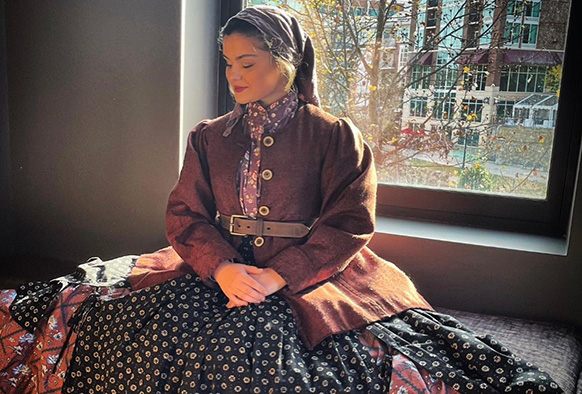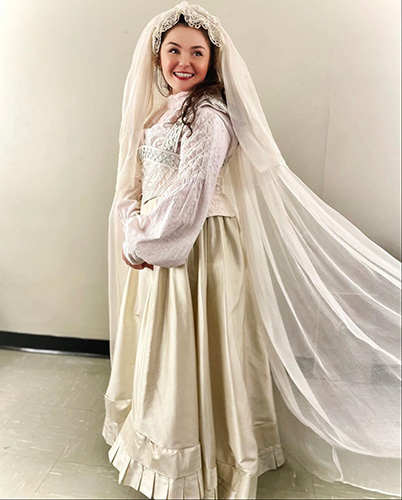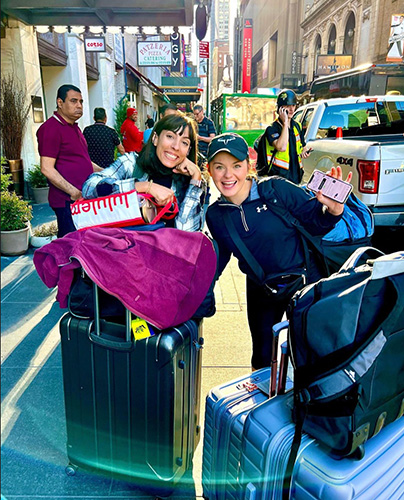
Lauren Steinart ’20 plays Rivka in the National Broadway Tour of Fiddler on the Roof.
She has appeared as Christine Daae in The Phantom of the Opera (concert), Catherine in Pippin, Belle in Disney’s Beauty and the Beast, and Ariel in Disney’s The Little Mermaid to name a few of her recent credits. Now Lauren Steinert ’20, who earned a bachelor of music in classical voice, is making her Broadway National Tour debut in Fiddler on the Roof under the direction of esteemed Tony Award winners Bartlett Sher and Sari Ketter. Steinert is cast in the role of Rivka and is the understudy (first cover) for the lead women Tzeital and Hodel and second cover for Fruma-sarah. The production has been touring since September of 2022 and runs through May 17, 2023, and will have been shown in 55 U.S. cities and 3 major cities in Canada. Inside Moravian caught up with Steinert on the phone from her hotel room in Billings, Montana, prior to a performance. The theater company had just completed their Canadian tour.
Inside Moravian: As an understudy, have you had an opportunity to play one of the lead roles, and if so, how was that experience?
Lauren Steinert: For every show, I perform as Rivka, unless told that I’ll be in as one of the roles I understudy. I recently went on as Tzeitel. It was a fantastic experience to have my first performance in that role outside of rehearsals because I had never performed the role in its entirety. It was a special day.
The day I was called to go on, I had just finished practicing through all my roles with my friend and roommate, Tayler Mettra (she is the best), running over the blocking, scenes, and dances.
In this industry, usually an actor is informed within a given set of hours before the performance, and unfortunately our principal was under the weather. When duty calls, understudies and swings (performers who go on if someone in the ensemble is unable to do so) must be ready to go at the drop of a hat. That day I had less time than understudies typically have, so it being my first principal performance, I hurried to the theater. Once there, I had my costumes fitted and altered, ran through dances with the cast for traffic patterns, had a music rehearsal, reviewed all transitions on and off stage for blocking, props, and costumes, then had about 10 minutes for hair and makeup before being hurried out on stage for the start of the show.
More nerve-racking than the memorization of the role’s dialogue and music are the onstage blocking (movement), and offstage transitions (wardrobe changes and props). This sometimes sounds daunting to those outside this industry, but for performers, it’s our job.
I am very fortunate to be part of a cast that is a special group of people and fiercely supportive. When we got the notification that I would be going on as Tzeitel, so many people called and messaged to say how excited they were or asked how I was doing and how they could help to make my first performance run smoothly. Our stage managers, music director, dance captain, wardrobe heads, props/stagehands, and other castmates were the most incredible support system. I could not be more grateful for them.
Traditionally at the curtain call (bows), when a cast member makes their principal debut, the cast is allowed to clap for that actor, while in normal conditions we stand still. When I came forward to take my bow with the other two lead sisters, Hodel (GraceAnn Kontak) and Chava (Yardén Barr), they didn’t bow but instead stood on each side and presented me to the audience. It was incredibly touching and selfless and such a surprise! I will never forget that moment. It meant the world.

IM: How did you know how to play the role of Tzeitel if you had never practiced it all the way through with the other actors?
LS: In addition to the eight shows we do each week are music and dance brush-ups, understudy rehearsals, and put-in performances [a rehearsal when a new actor or understudy performs their entire role in order and in costume with all the cast members and technical elements that affect the role]. Crazy right? But to all performers in this business, that’s just another day on the job.
While I hadn’t performed the role of Tzeitel in its entirety in a rehearsal, I had worked with our directors and dance captain during rehearsals, watched every principal’s rehearsal, reviewed all performance tapes and taken my own notes, read our director’s script of notes about the show and characters, and I would practice scenes in my hotel room with my roommate. My castmates are also so giving of their time and help to clarify any questions we may have when learning their roles.
Additionally, on most days, I track the characters I understudy in the wings while the show is being performed. So while the audience is watching the characters on stage, there is a good chance that we understudies and swings are watching them in the wings or backstage performing and rehearsing the exact same thing by ourselves. After watching, I’ll write more notes about what I saw and heard. Watching the performances helps us to feel the tempo of dialogue and music, to observe the spacing and blocking on stage for spatial relevance, and to see the props and lighting; we usually do not get the chance to touch the props or practice on stage. All these little tasks sound tedious, which they are, but they are how we do our job and keep the consistency of the characters that we play.
IM: What has your overall experience been with this show?
Many people who are not in this industry have the perception that these creative and performance contracts and careers are glamorous. I find it rewarding, but like millions of working people, I have a job and a career. It is just a different type of job and career choice that requires a specific skill set.
In, Fiddler on the Roof, I learned and prepared four roles (two lead, one supporting, one ensemble), four costume tracks, and four blocking/choreography and transition tracks (where to move on stage in relation to other characters, props, and lighting). What is important aside from hitting our marks, line and music memorization, and the tiny specifics, is to remember the character that you are portraying, to embody their choices and intentions. If we made a performance look easy, or if we enraptured someone or moved an audience member in the world that we’ve created on stage, then we did our job.

This contract is my first tour, and I must say touring is exhausting, but I am so fortunate to have this experience. I remind myself that I am getting paid to do what I am passionate about, to continue to develop my skills, to perform with a wickedly talented group of people, to be educated by world-class directors, and to travel to places that I have always wanted to go to or that I might not have visited otherwise. I get excited to bring a New York Broadway production and company to different cities and venues across North America.
This profession is most certainly rewarding but not everything is roses all the time. I believe that maintaining good mental and physical health is top priority in this career. At the end of the day, I find peace in journaling and always write three things that I am grateful for in that day. It is good to have interests and activities to put energy into outside of work.
IM: Performing in musical theater sounds grueling. What do you enjoy about the job you’re doing?
LS: For me, especially after a few years of inactivity due to the ongoing Covid pandemic, I am overjoyed to create art. It is exciting to use all the tools that I have been trained in over the years. I am most grateful for the platform to use my skill set because it is what makes me feel fulfilled.
Even though I have only a short while on earth, I feel most human when performing because I feel that I am giving and serving others while being present and enjoying the creative process around me. Every time I am on stage, I think to myself, “I do not know what an audience member needs when they come into the venue, whether it be that they love the show, are going through something difficult in their life, are supporting a friend, or that they simply want to be transfixed and entertained.” By being present, every person in their seat will be moved in some way but only in the avenue that they actively and voluntarily seek. I believe that any outlet of performing is human connection through artistic expression; it is mutually transformative to performer and audience member, because sharing and exchanging energies and emotions makes us human. Knowing and reminding myself of those things, I believe, makes me a better learner and a more present and active performer.
IM: What advice do you have for students who would like to pursue a singing career or the theater?
LS: This is by no means an easy career choice, but it is very rewarding when you are given the opportunity. Before going into this career, take into consideration the life choices you will have to make and confront. Communication with friends, family, and significant others is key to a happy and prosperous life outside of the job.
At this stage in my life and career, I advise knowing your strengths and limitations. Of course everyone wants to be good at everything—singing, dancing, acting—wanting to be a triple-threat. That’s just the industry. Having training in all areas is standard going in, but knowing your marketable traits and qualities is key. Not everyone is going to be proficient in every category, and that is alright! That’s what makes it exciting while you train, you can find the things that make you you! Additionally, whether your training comes through higher education or going out into the world and getting hands-on experience, consider these words that a wise mentor told me, “Anyone can be a performer, but the best and smartest performer is always a student first.”
From personal experience, aside from studying, practicing, etc., I think it is better to focus on highlighting the areas where you’re confident and not spread yourself too thin when auditioning. While my opinion may change as I grow in this career, I hold it true for myself and other colleagues and teachers I have spoken with. I wouldn’t put myself in a specific niche, if I know I am better suited in other areas. That does not mean that role is out of the realm of possibilities, but I could be taking myself out of another job that is better suited to my strengths. Take classes on what you believe may limit you in your performance career.
My biggest piece of advice and what I firmly believe is that you must be your own self-starter and first agent. Success, in however you define it, will not be handed to you. Learn beyond your music classes and lessons. Research, listen to podcasts, audit college courses, take masterclasses, audition, and get out there! Make the connections, learn how to market yourself, take a business class, and do not limit your training to just your professors, have other eyes and ears on you.
I have always educated myself by seeking and connecting with the people who have the career and jobs I want. Surround yourself with those people, work your butt off, and develop a persistent personality and work ethic. That is how you’ll find your way in this industry. When I asked my middle school music and band teacher, Debra Heiney, whom I’ve always admired, how I can perform at a professional level when I’m older, she said, “If you want to be successful, surround yourself with successful people.” If you want to achieve success, you’ll gravitate to a group of like-minded, forward-thinking individuals who work toward similar goals and have mutualistic, collaborative relationships. There you’ll see the most growth.